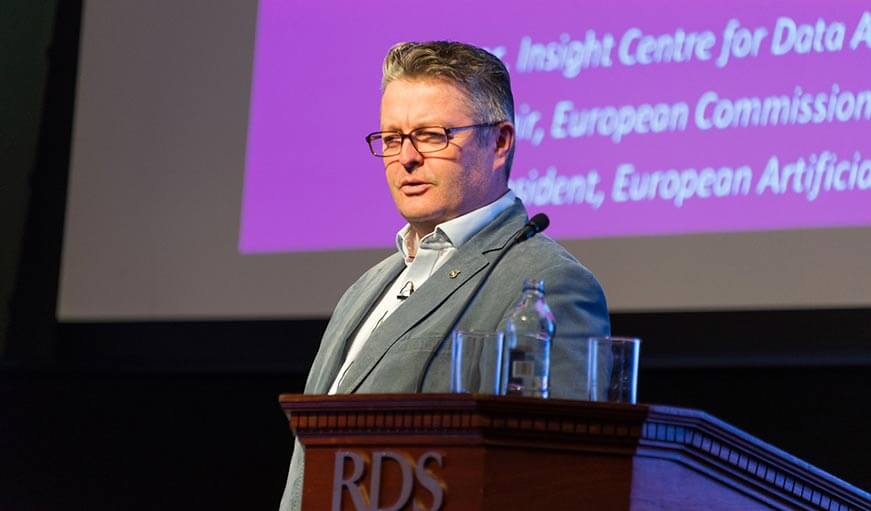
The Insight Centre for Data Analytics at University College Cork would like to see if they could reduce hospital outpatient waiting lists by building a tool which would allow health managers to understand the consequences of what might seem to them very small decisions, Prof Barry O’Sullivan, MRIA, Director, Insight Centre for Data Analytics, University College, Cork, Vice Chair, European Commission High-Level Expert Group on AI and President, European Artificial Intelligence Association, told the Conference.
“It is difficult for managers to understand that the consequences of, say, changing scheduled hospital appointments from 15 minutes to 20 minutes, can be enormous
Prof. O’Sullivan, who was speaking on “The Power of AI & Data in Healthcare Management,” is also a member of The European Commission new high-level expert group on artificial intelligence.
The Insight Centre for Data Analytics has over 450 academics, researchers, engineers and PhD Students and over €1 million in funding. The EurAI is one of the world’s largest AI associations with over 4,500 members across 30 countries.
Prof. O’Sullivan said that part of his current work with colleagues was to concentrate on outpatient waiting lists, develop a strategy for appointment decision-making and, see if they could develop a tool which would help managers to understand the impact of decisions and support current stakeholders.
He emphasised that what they were not about was building an automated appointment scheduling tool.
They had analysed the current demand and the outpatient appointment challenge. “The appointments conundrum is that wehave to give ‘‘routine’’ appointments before knowing ‘‘urgent’’ demand, there is limited capacity, no overtime allowed (Croke Park agreement) and we have to decide how much capacity to set aside for urgent cases and how much over booking is possible.
“The ways to improve were toincrease capacity; Reduce DNAs, decrease ratio return to new appointments, move patients between consultants, move patients between hospitals and avoid unused slots, while ensuring fair treatment of all patients within same category. “
“We should at least be able to understand waiting list management, if not solve it. if you have one resource and are trying to deal with urgent and routine demands, you might reserve time on an MRI scanner in 30 minute slots for routine cases and in 90 minute slots for urgent cases.
“Very small decisions have an enormous impact on service delivery and there is no way a human being can understand the huge impact of making a decision on the amount of time of reserved for each appointment.
If we made very small changes we could almost eliminate waiting lists. Where outpatient waiting lists are concerned, we want to see if we can build a tool which would allow managers to understand the consequences of their decisions. It is difficult to understand that the consequences of changing something from 15 minutes to 20 minutes can be enormous.
Prof. O’Sullivan said that the amazing thing about the successes of AI was that it told us nothing about intelligence. We had learned how to harvest vast amounts of data.
“The scheduling problem in a hospital is more unknown that atoms in the universe and we want to try and give you tools to understand the consequences of your decisions.
“We are interested in looking at all kinds of waiting lists, at average waiting time, at different metrics. We can plot what will happen if we manage patients between hospitals, we are plotting what would happen if we eliminated DNAs and then if we added capacity.
“We have tools that will help you look at the consequences of your decisions and we would love to talk to you about how we can use these for waiting lists.”
Prof. O’Sullivan said that quite separately they were looking at living organ kidney exchanges. “We are looking to see if we could exchange kidneys in a small group situation. I may be happy to give my kidney to somebody but that person may not be compatible, so perhaps we could find another pair where there would be compatibility.
He said there was a revolution coming in AI so there would be a marriage between data as manifestation of AI and the expertise which managers have.
“We are developing a set of ethical guidelines for the European Commission and how it should fund AI and what the challenges and opportunities are.
The European Commission will be spending €10billionn of its funds on AI.
Prof. O’Sullivan said that the amazing thing about the successes of AI was that it told us nothing about intelligence. We had learned how to harvest vast amounts of data.
“AI can read radiology scans with a very high degree of accuracy but it knows nothing about radiology.AI as a term was invented in the ‘50s and they thought it could be solved in six weeks. The kind of difficulties that have held AI back over 70 years are the kinds of complexities that healthcare professionals deal with every day.“
The availability of data and the fact that machines had got so much faster had revolutionised the field. “The amount of power and data used is enormous, so don’t be fooled by the power of data. It is important we have it but that is just the beginning. The challenging thing is what to you do with it afterwards.

